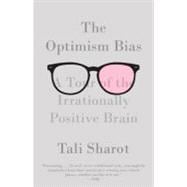
Note: Supplemental materials are not guaranteed with Rental or Used book purchases.
Purchase Benefits
What is included with this book?
Tali Sharot’s research on optimism, memory, and emotion has been the subject of features in Newsweek, The Boston Globe, Time, The Wall Street Journal, New Scientist, and The Washington Post, as well as on the BBC. She has a Ph.D. in psychology and neuroscience from New York University and is the director of the Affective Brain Lab and an Associate Professor of Cognitive Neuroscience in the department of Experimental Psychology at University College London. She lives in London.
The New copy of this book will include any supplemental materials advertised. Please check the title of the book to determine if it should include any access cards, study guides, lab manuals, CDs, etc.
The Used, Rental and eBook copies of this book are not guaranteed to include any supplemental materials. Typically, only the book itself is included. This is true even if the title states it includes any access cards, study guides, lab manuals, CDs, etc.
Table of Contents
Prologue: A Glass Forever Half Full?
1. Which Way Is Up?Illusions of the Human Brain
2. Are Animals Stuck in Time?The Evolution of Prospection
3. Is Optimism a Self- Fulfi lling Prophecy?How the Mind Transforms Predictions into Reality
4. What Do Barack Obama and Shirley Temple Have in Common?When Private Optimism Meets Public Despair
5. Can You Predict What Will Make You Happy?The Unexpected Ingredient for Well- being
6. Crocuses Popping Up Through the Snow?When Things Go Wrong: Depression, Interpretation,
and Genes
7. Why Is Friday Better Than Sunday?The Value of Anticipation and the Cost of Dread
8. Why Do Things Seem Better After We Choose Them?The Mind’s Journey from Expectation to Choice and Back
9. Are Memories of 9/11 as Accurate as They Seem?How Emotion Changes Our Past
10. Why Is Being a Cancer Survivor Better Than Winning the Tour de France?How the Brain Turns Lead into Gold
11. A Dark Side to Optimism?From World War II to the Credit Crunch—Underestimating Risk Is Like Drinking Red Wine
Epilogue: A Beautiful Mademoiselle or a Sad Old Lady?From Prediction to Perception to Action
Acknowledgments
Notes
Index